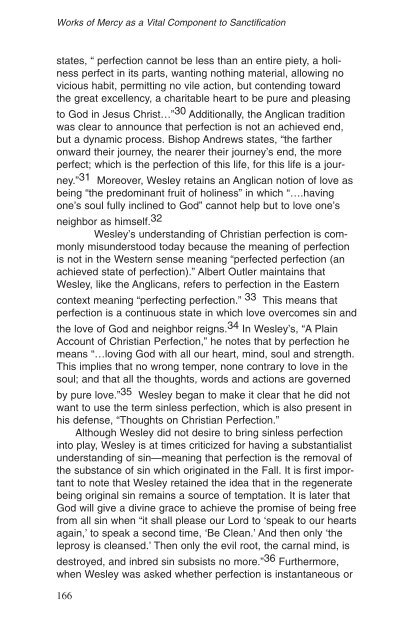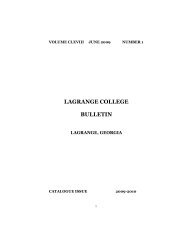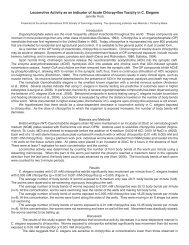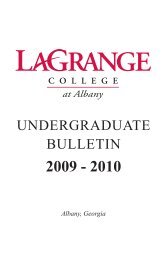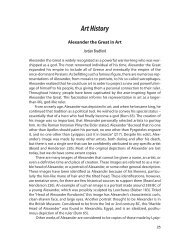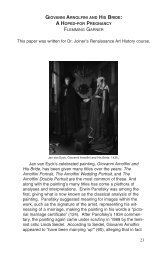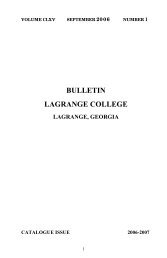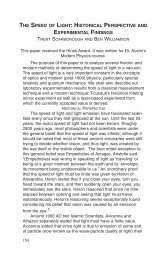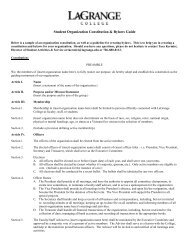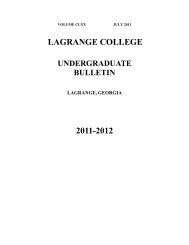Works of Mercy as a Vital Component to Sanctification - LaGrange ...
Works of Mercy as a Vital Component to Sanctification - LaGrange ...
Works of Mercy as a Vital Component to Sanctification - LaGrange ...
You also want an ePaper? Increase the reach of your titles
YUMPU automatically turns print PDFs into web optimized ePapers that Google loves.
<strong>Works</strong> <strong>of</strong> <strong>Mercy</strong> <strong>as</strong> a <strong>Vital</strong> <strong>Component</strong> <strong>to</strong> <strong>Sanctification</strong><br />
states, “ perfection cannot be less than an entire piety, a holiness<br />
perfect in its parts, wanting nothing material, allowing no<br />
vicious habit, permitting no vile action, but contending <strong>to</strong>ward<br />
the great excellency, a charitable heart <strong>to</strong> be pure and ple<strong>as</strong>ing<br />
<strong>to</strong> God in Jesus Christ…” 30 Additionally, the Anglican tradition<br />
w<strong>as</strong> clear <strong>to</strong> announce that perfection is not an achieved end,<br />
but a dynamic process. Bishop Andrews states, “the farther<br />
onward their journey, the nearer their journey’s end, the more<br />
perfect; which is the perfection <strong>of</strong> this life, for this life is a journey.”<br />
31 Moreover, Wesley retains an Anglican notion <strong>of</strong> love <strong>as</strong><br />
being “the predominant fruit <strong>of</strong> holiness” in which “….having<br />
one’s soul fully inclined <strong>to</strong> God” cannot help but <strong>to</strong> love one’s<br />
neighbor <strong>as</strong> himself. 32<br />
Wesley’s understanding <strong>of</strong> Christian perfection is commonly<br />
misunders<strong>to</strong>od <strong>to</strong>day because the meaning <strong>of</strong> perfection<br />
is not in the Western sense meaning “perfected perfection (an<br />
achieved state <strong>of</strong> perfection).” Albert Outler maintains that<br />
Wesley, like the Anglicans, refers <strong>to</strong> perfection in the E<strong>as</strong>tern<br />
context meaning “perfecting perfection.” 33 This means that<br />
perfection is a continuous state in which love overcomes sin and<br />
the love <strong>of</strong> God and neighbor reigns. 34 In Wesley’s, “A Plain<br />
Account <strong>of</strong> Christian Perfection,” he notes that by perfection he<br />
means “…loving God with all our heart, mind, soul and strength.<br />
This implies that no wrong temper, none contrary <strong>to</strong> love in the<br />
soul; and that all the thoughts, words and actions are governed<br />
by pure love.” 35 Wesley began <strong>to</strong> make it clear that he did not<br />
want <strong>to</strong> use the term sinless perfection, which is also present in<br />
his defense, “Thoughts on Christian Perfection.”<br />
Although Wesley did not desire <strong>to</strong> bring sinless perfection<br />
in<strong>to</strong> play, Wesley is at times criticized for having a substantialist<br />
understanding <strong>of</strong> sin—meaning that perfection is the removal <strong>of</strong><br />
the substance <strong>of</strong> sin which originated in the Fall. It is first important<br />
<strong>to</strong> note that Wesley retained the idea that in the regenerate<br />
being original sin remains a source <strong>of</strong> temptation. It is later that<br />
God will give a divine grace <strong>to</strong> achieve the promise <strong>of</strong> being free<br />
from all sin when “it shall ple<strong>as</strong>e our Lord <strong>to</strong> ‘speak <strong>to</strong> our hearts<br />
again,’ <strong>to</strong> speak a second time, ‘Be Clean.’ And then only ‘the<br />
leprosy is cleansed.’ Then only the evil root, the carnal mind, is<br />
destroyed, and inbred sin subsists no more.” 36 Furthermore,<br />
when Wesley w<strong>as</strong> <strong>as</strong>ked whether perfection is instantaneous or<br />
166


